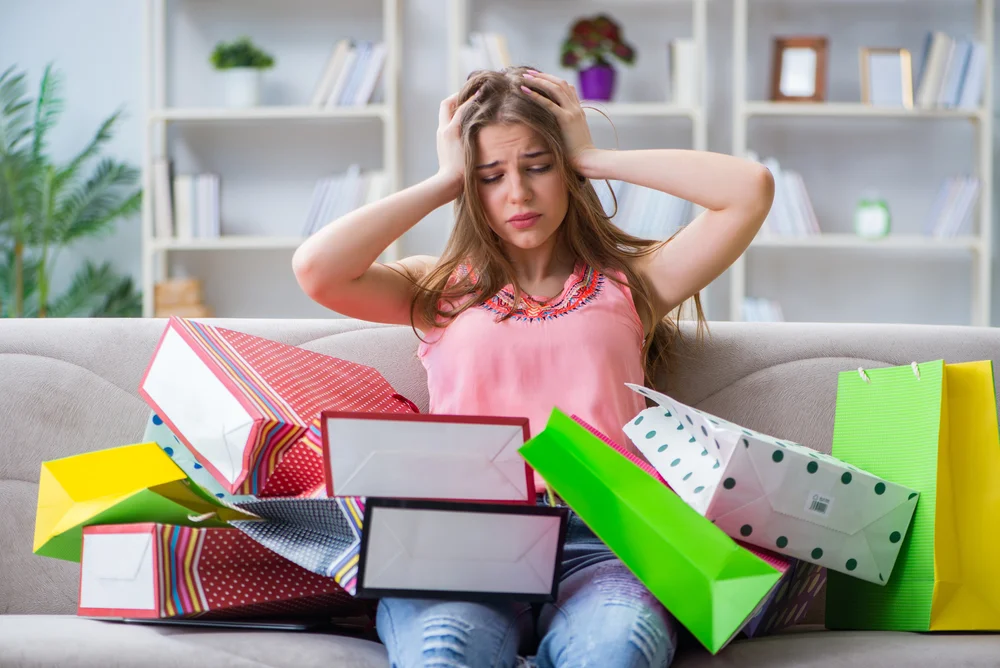If you indulge in retail therapy when you need to cheer yourself up, or feel you deserve some shopping spoils, you’re in good company – most of us can relate to this. However, if you lack impulse control and routinely overspend, you may have a shopping addiction.
We explore what it means to be a “shopaholic”, and consider proactive remedies for this potentially damaging habit.
Tip: Debt consolidation can help you restore your cash flow if you have overspent.
What is shopping addiction?
Shopping addiction, or “shopaholism”, refers to a behavioural cycle of shopping to excess for items you don’t really need, and feeling shame or guilt after overspending. The term does not apply to the occasional impulse purchase, but to repeated behaviour that compromises your financial wellbeing.
Psychologist Quinton Williams says that shopaholism is one of many potential addictions. It’s an easily-formed behaviour that provides physical pleasure and relief from emotional pain. Williams says that this – or any addiction - can affect the brain’s neurotransmitter system, as much as chemical substances do.
“There are differences, however, in that a shopaholic’s feelings of euphoria are triggered by the act of shopping and the anticipation of reward, not by a drug,” he says.
Williams notes that shopaholism is often accompanied by underlying anxiety or depression, where the shopping cycle is driven by unresolved and painful emotions, or discomfort that needs to be eased.
Shopping releases the “feel good” hormones endorphins and dopamine, and these cause momentary euphoria, he explains. Any shame or guilt that arises is numbed by further spending.
“As with all addictions, this can be progressive – you may be driven to shop more frequently, or make bigger purchases,” he says.
External drivers of shopping addiction
Aside from the emotional and psychological aspects that fuel addiction, we are also influenced by our environment. We live in a society that increasingly promotes material gain and instant gratification.
“We often try to keep up with trends and social media influencers,” says Adele Barnard, senior financial planner and investment specialist at Sanlam. “This gives us a sense of security and social standing, which may fill a void within us. We don’t realise that what we see is often ‘all flash, no cash’.”
The problem is compounded by the fact that credit is so easily accessible.
“Many people sign up for retail or store accounts, or credit cards, without fully understanding the impact of interest and administration fees,” Barnard says. “In addition, we see shops and advertisements all day long – this retail exposure doesn’t help.”
Signs and symptoms of shopaholism
If you suspect you have a shopping addiction, the first step is to acknowledge the problem.
Williams says typical signs and symptoms include:
- Shopping to cope with stress or to distract you from negative feelings;
- Experiencing intense euphoria when spending, but feeling dissatisfied after making purchases;
- Purchasing unnecessary items;
- Stealing so you can shop;
- Maxing out your credit cards without paying off what you have already purchased, or exhausting your funds;
- Being unable to pay off debt, and;
- Living with continuous feelings of dread, fear, anxiety, and unhappiness, which interfere with sleep, eating, and energy levels.
Treatment and tips to help overcome your addiction
There are three key phases in treating any addiction, Williams explains. These include:
- Identifying and acknowledging the issue
- Seeing a counsellor or therapist to work through it
- Receiving ongoing support from support groups, family, and friends
He adds that appropriate medication, prescribed by either a general practitioner or specialised psychiatrist, may be necessary.
Bernard adds that there are simple, proactive steps you can take to begin the healing journey.
- Do not feel a sense of shame. “We need to normalise talking about shopping addiction, just like any other addiction,” she says.
- Understand your spending triggers and write down how you feel before you spend.
- Learn that there is more to life than shopping and acquiring material items.
- Value the items you already have and take better care of them.
- Discuss with your therapist or counsellor the tools you need to strengthen your self-esteem, and invest in acts of self-care that don’t involve spending.
- End your relationship with your store account or credit card if you aren’t disciplined enough to avoid overspending.
- Engage the services of a credit management coach or financial adviser. “Having an accountability partner can help you overcome the problem and rehabilitate yourself if you are in debt,” Barnard urges.
Tip: Knowing your credit score can bring a sense of accountability to your finances.

